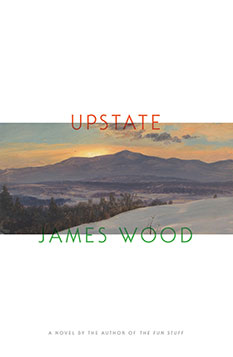
I bought the novel, Upstate, because I was curious to see the art (or craft?) of an admired critic. How does James Wood’s work measure up when held to his own standards?
My personal impression: while the novel is well crafted, it is careful and stodgy. It violates my personal dictum that if you write a lot of dialogue, you may in fact be writing a play masquerading as a novel. Be honest with yourself and switch to the medium that better suits your purposes.
Upstate concerns an aging property developer from Northumberland and his relationship with his two adult daughters. The younger, Helen, has landed on her feet: married, twins, a successful career with a record label, a go-getter. The older, Vanessa, has always been more emotionally fragile. Recently, she took a tumble on her front steps and broke her arm in two places. There is a question whether this was a deliberate play for attention by somebody falling into (yet another) depression.
Vanessa’s boyfriend, Josh, has “summoned” both Helen and her father to visit them in Saratoga Springs, upstate New York, hence the novel’s title. Richard flies to New York City where he meets Helen, and together they ride a train into the countryside. So begins what, at first blush, appears to be a Jamesian trope, only instead of the American Strether off to Europe to effect a rescue, the British Richard comes to America thinking to take his daughter home, or at least to assess the situation. As in The Ambassadors, Richard must first address the disorienting effects of culture shock (apart from obvious things like accent and driving). There is the winter snow, the cold, the clear skies, the American absence of reserve. But things thaw, both literally and figuratively, and Richard warms to Vanessa’s life in America.
As in The Ambassadors, there is a sense of a presence at home. It has a hold on Richard and reels him back. This is Candace, his second and much younger wife, and the girls wryly dub his home Candyland. The first wife, their mother, walked out on the family some years ago and subsequently died. Because of her death, their family dynamics are fraught with unknowability. It is always problematic to ascribe certain motivations to the dead. Although it must be tempting to engage in a bit of authorial intrusion, Wood resists that temptation and leaves the unknowability intact. Like the daughters, the best we can do is speculate as to the causes of family dysfunction.
To the extent that the novel engages us in dramatic tension, it lies in the largely unstated struggle Richard experiences in resolving conflicting loyalties. In The Ambassadors, the tension is resolved through a wholesale conversion; in Upstate, we have nothing so revolutionary. Instead, Wood steers a postmodern course and addresses the tension in a provisional manner: Richard postpones his flight home and decides to stay with Vanessa a little while longer.